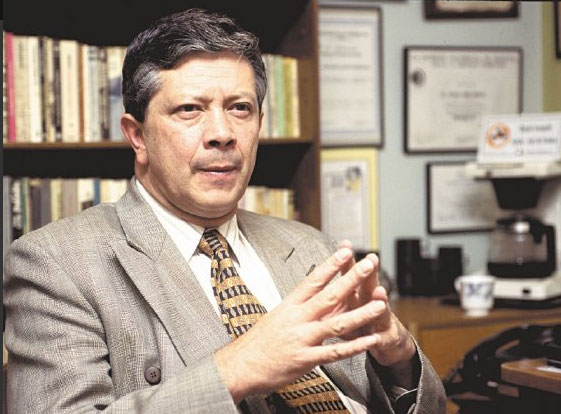Eduardo Umaña Mendoza, one of Colombia’s most prominent human rights lawyers, was shot dead on 18 April 1998 in his Bogotá apartment by two men and one woman who identified themselves as journalists.
For 30 years, Eduardo was a leading human rights defender in Colombia who founded a number of Colombia’s most well-known national non-governmental human rights organizations. Eduardo represented numerous people and sought justice in many high-profile human rights related cases, which implicated state actors. In particular, he vigorously condemned the role of the security forces in human rights violations committed in the context of Colombia’s long-running internal armed conflict and the failure of the authorities to bring the vast majority of the perpetrators to justice.
Eduardo’s killing took place in the context of an ongoing campaign of terror, including extrajudicial executions, kidnappings and enforced disappearances, carried out by the security forces and paramilitaries, either acting alone or in collusion with each other. In March 1998, a few weeks before Eduardo’s death, the national paramilitary umbrella organization, the Autodefensas Unidas de Colombia (AUC) or United Self-Defence Forces of Colombia, had reiterated its threats against members of human rights groups and non-governmental organizations by declaring them “un objetivo militar” – a military target – and by affirming its intention to abduct these individuals.
Eduardo’s son, Camilo Umaña, was 12 years old when his father was killed. As Camilo has said about his father, “My Dad understood that the defence of human rights was not only legal but political, not only political but social, not only social but intimate”.
Scores of human rights defenders have been killed or disappeared in Colombia in the last decades. At the time of Eduardo’s death, many were subjected to death threats and other forms of intimidation, which in some cases were followed by attempts on their lives. Those who denounced human rights violations committed by the security forces or paramilitaries were often the target of serious human rights violations. Similarly, those who made public the close links between security forces and paramilitary forces were accused of being guerrilla sympathizers and were subsequently subjected to death threats and other human rights violations.
Consecutive governments at the time kept promising that they would provide protection for human rights defenders at risk. Despite the authorities being fully aware of the death threats against Eduardo, they failed to provide him with adequate protection. This omission was fatal.
Colombia’s more than 50-year-old conflict has been marked by crimes under international law and the failure to bring to justice most of those with criminal responsibility for such crimes. The conflict, which has pitted the security forces, either acting alone or in collusion with paramilitary groups, against a variety of guerrilla groups, has left almost 8 million victims. Since 1985, there have been more than 267,000 conflict-related deaths, most of them civilians, almost 7 million victims of forced displacement and more than 46,000 victims of enforced disappearances.
Despite the ongoing peace process between the government and the FARC, vulnerable groups and communities, such as Indigenous people and Afro-descendant and peasant farmer communities, as well as human rights defenders (including community leaders and land rights activists), continue to face a litany of human rights abuses and violations, including killings and death threats.
Investigation
Those responsible for Eduardo’s death have never been brought to justice. Investigations, however, continue into his death. On 27 September 2016, the Office of the Attorney General in Colombia stated his killing was a crime against humanity. According to the Attorney General’s Office Resolution (No. 047) issued on that day, Eduardo was killed because of his human rights work.

